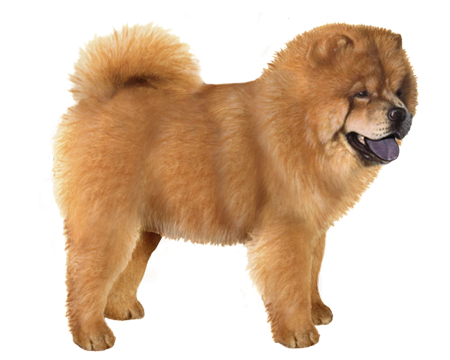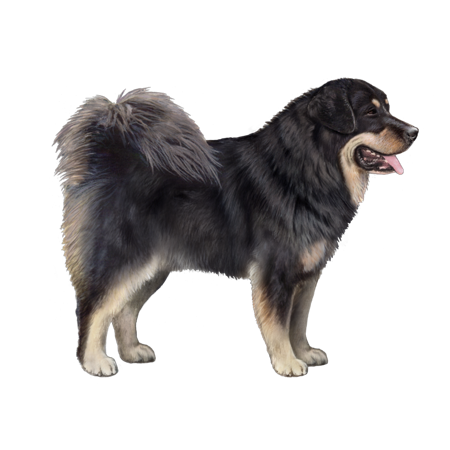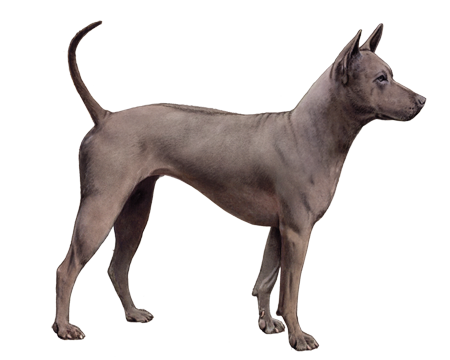
Chow Chow
Bred to guard sacred temples and hunt, the Chow Chow retains its strong work ethic and guarding tendencies. Those who own these refined yet puffy "lion dogs" can attest to their loyalty.
Interested in discovering if your dog is a Chow Chow?
Check out Wisdom Panel's DNA tests.

Chow Chow Traits
General Appearance
The Chow Chow is a compact, stout breed with a large head and a short, deep muzzle. Small, pointed ears and deep-set eyes make it appear as though the breed is scowling. The long fur and a "mane" around the neck earned the Chow Chow the nickname "lion dog."
Coat and Colouring
Chow Chows have two separate coat types: rough and smooth. Both are densely double-coated. But the rough coat's fur is straight and coarse with a thick, wooly undercoat. The smooth coat is, well, smooth and has an undercoat but no obvious "ruff" on the legs or tail.
The breed standard includes five colors: red, black, blue, cinnamon, and cream. In red Chow Chows, the shade ranges from light golden to deep mahogany. Cinnamon Chow Chows vary from light fawn to deep cinnamon.
Distinctive Physical Traits
A blue-black tongue is a hallmark of the breed. The Chow Chow's lips, gums, and mouth are also blue-black in color—with the darker colors preferred for the breed standard. Chow Chows share this distinction with the Chinese Shar-Pei.
Chow Chow Temperament
Famous for its devoted and protective nature, the Chow Chow tends to be independent and not very affectionate—even toward beloved owners. Though these dogs tolerate children, their stature, strength, and guarding tendencies call for close supervision.
Chow Chows are wary of strangers and unfamiliar dogs, which is why they make such excellent guard dogs.


Chow Chow History
The Chow Chow likely originated in China (or possibly Mongolia or Manchuria) and has been around for at least 2,000 years. Some experts believe the Tibetan mastiff and Samoyed contributed to the breed.
The name "chow" may come from the Cantonese word for edible, and these dogs might have actually been a source of food in ancient China. However, the British expression "chow chow" (describing odds and ends transported on cargo ships) could have also been the inspiration for the breed's name.
Throughout history, Chow Chows have been faithful companions to nobility in China and elsewhere. For example, Queen Victoria of England received the breed as a gift in 1865. The Chow Chow reached peak popularity in the 1980s, and their numbers have declined steadily over the last decade.
Chow Chow Care
Nutrition
All dogs thrive on a high-quality diet designed for their life stage (e.g., puppy, adult, senior), and Chow Chows are no exception. These pups also tend to be slightly overweight, and their heavy coats can hide the extra pounds. To avoid weight problems, measure out your dog's meals, minimize the number of treats, and steer clear of table scraps or high-fat items that could lead to weight gain.
Grooming
Chow Chows are fastidious—often compared to cats for their lack of odor and overall cleanliness. But brushing them at least twice per week removes dead hair and helps control shedding. You should spend extra time grooming the fur around their heads, which can develop into painful mats if not brushed out regularly. And after a bath, use an air dryer (on the "cool" setting) to thoroughly dry your dog's coat.
All grooming routines should also include trimming nails, cleaning ears, and brushing teeth.
Exercise
The Chow Chow might be a working breed. But its exercise needs are actually quite minimal. Daily walks and games of fetch in the yard are usually enough to tire out these dogs.
Avoid exercising your Chow Chow during hot weather, as the breed struggles in high heat and humidity and isn't suited for vigorous exercise. In cold weather, these well-insulated dogs may be extra playful.
As long as Chow Chows receive short bouts of physical activity regularly, they adjust well to apartment living.
Training
The same independent nature and stubbornness that makes Chow Chows excellent guard dogs can make them challenging to train. You should be firm in your approach. But avoid being too forceful, which can degrade trust and cause the breed to rebel.
Early socialization and consistent obedience training (that includes praise and treats) can turn an aloof, overprotective Chow Chow into a loyal family dog and safe household companion.

Chow Chow Genetic Health Conditions
-
Chondrodystrophy (CDDY) and Intervertebral Disc Disease (IVDD) Risk
Chondrodystrophy (CDDY) is a skeletal disorder characterized by shortened limbs and abnormal early degeneration of the spinal discs, or intervertebral disc disease (IVDD), which predisposes to disc herniation.
-
Hereditary Elliptocytosis
Hereditary Elliptocytosis is a disease where the red blood cells are abnormally oval shape, rather than the characteristic biconcave or dumbbell shape that is normally seen.
Knowing if your Chow Chow is a carrier or at-risk for these conditions can help you and your veterinarian plan for your pup's lifelong care. With Wisdom Panel™ Premium, you can get results for over 200 genetic health tests.
Breed Group
Asian and Oceanian
The Asian and Oceanian group is comprised of breeds whose origins lie in Asia, which have spread as far as Australia, the islands of the Pacific, and the Arctic. This group is possibly the most ancient of all breed groups and were bred for a variety of purposes, including guarding, hunting, and as draft dogs.












































